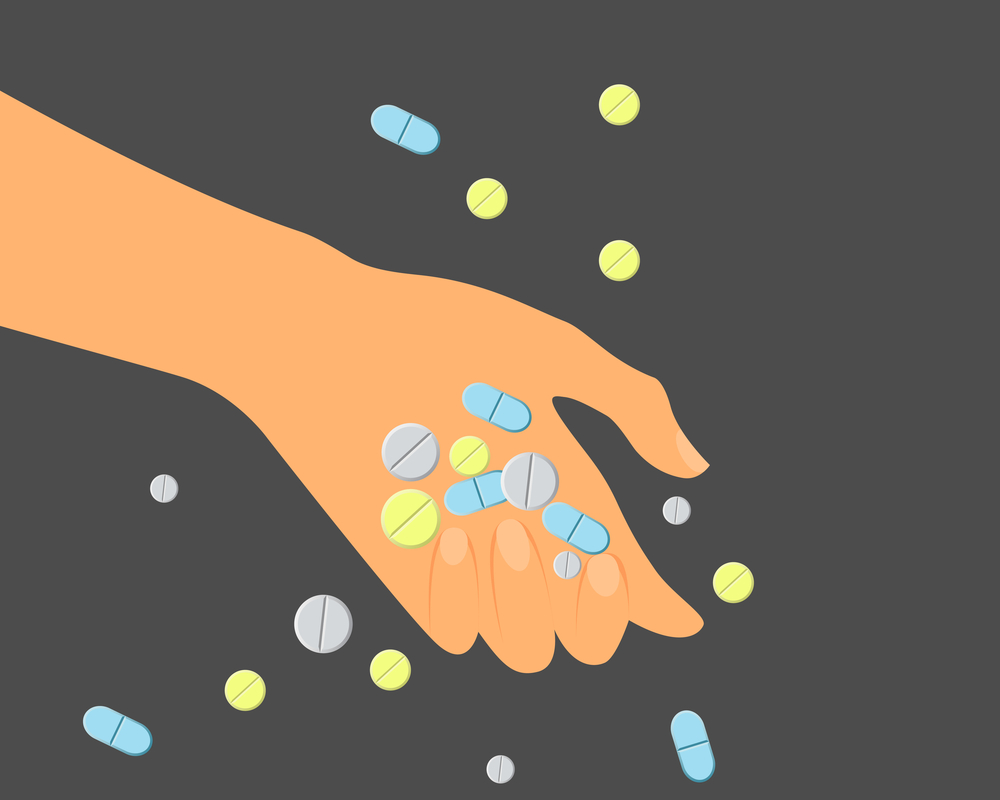Despite the argument that psychiatric treatment helps prevent suicide in major mental illnesses, new research shows that suicide is the most common cause of death for those with bipolar disorder (BD), even after treatment. And despite the argument that those who die by suicide are likely to be “off their meds,” the data shows that 48% of those who died by suicide did so specifically by overdosing on their psychiatric drugs.
The researchers found that people treated for bipolar disorder were six times more likely to die from accidents or suicide (external causes) and twice as likely to die of health problems (somatic causes) than the general population.
“Individuals with BD had sixfold higher mortality due to external causes and twofold higher mortality due to somatic causes,” the researchers write.
The study, published in BMJ Mental Health, was led by Tapio Paljärvi at Niuvanniemi Hospital, Finland, and included researchers from the University of Eastern Finland, Karolinska Institute in Sweden, the University of Southern Denmark, and the Oxford University, UK.
 The researchers included 47,018 people with bipolar disorder, identified through a Finnish nationwide registry that lists people with that diagnosis from inpatient hospitalizations and outpatient centers (thus, the participants were those who specifically received intensive treatment for BD). The participants were all diagnosed with BD between 1998 and 2018, and were 15-65 years old between 2004-2018. The median follow-up time was about eight years.
The researchers included 47,018 people with bipolar disorder, identified through a Finnish nationwide registry that lists people with that diagnosis from inpatient hospitalizations and outpatient centers (thus, the participants were those who specifically received intensive treatment for BD). The participants were all diagnosed with BD between 1998 and 2018, and were 15-65 years old between 2004-2018. The median follow-up time was about eight years.
Throughout the study, 3300 people (7%) died. The most common cause of death was suicide—740 people died by suicide, 353 (48%) of them by overdosing on psychiatric drugs.
There were also 265 deaths listed as “accidental poisonings,” and 123 (46%) of those were overdoses of psychiatric drugs. It is unclear whether some or all of the deaths labeled “accidental poisonings” should instead have been considered “suicide,” considering the stigma that causes suicide to be labeled “accidents” in official records.
Alcohol-related causes were lumped together as the second most common cause of death (595 people), including alcohol-related liver disease as well as alcohol poisoning and alcohol dependence.
Another 552 people died of cardiovascular disease (CVD). Research has found that those taking antipsychotics are more than three times as likely to die of CVD, even after accounting for confounding factors; those taking a combined treatment of phenothiazine-type antipsychotics along with antidepressants found their risk of death from CVD increased by more than 18 times that of the general population.
The current researchers write, “Because of the observed high total number of deaths due to CVD, much of the recent research on mortality associated with BD has emphasized the importance of preventing CVD deaths. Therefore, the cardiometabolic tolerability of medicines for treating BD has also received increased attention among clinicians.”
Researchers have repeatedly found that people with diagnoses of major mental illness tend to die several decades earlier than the rest of the population. Though treatment rates have increased significantly over time, a recent study in the UK found that this “mortality gap” is also growing.
The current researchers suggest that psychiatry should focus on preventing substance use and suicide, although they don’t delve into any specifics of how that differs from current treatment goals.
“Targeting preventive interventions for substance abuse will likely reduce the mortality gap both due to external causes and somatic causes. Suicide prevention remains a priority, and better awareness of the risk of overdose and other poisonings is warranted.”
****
Paljärvi, T., Herttua, K., Taipale, H., Lähteenvuo, M., Tanskanen, A., Fazel, S., & Tiihonen, J. (2023). Cause-specific excess mortality after first diagnosis of bipolar disorder: population-based cohort study. BMJ Mental Health, 26(1), 1-7. http://dx.doi.org/10.1136/bmjment-2023-300700 (Link)















Peter, this is a very tragic situation. Thank you for highlighting it.
Both of the books covered by Russell Brand below, carry a method by which “BiPolar” can be overcome.
“Letting Go” by Dr David R Hawkins
https://youtu.be/CqLU8nKau1M
“The Untethered Soul” by Michael A Singer
https://youtu.be/ub-MlDhQcAc
Report comment
No surprise.
At age 61, I refused Seroquel, because – I wasn’t “willing to risk a stroke” (see BEERs list, and risks of antipsychotics, in those over age 65).
I had had a heart arrhythmia, but never reported it (long ago, I stopped telling doctors anything). On Seroquel, it felt like I could feel my heart turning over, as the irregular heartbeat occurred. Off Seroquel, I could no longer feel that heart roll (or whatever it was).
I reported the adverse event to the EHS.
I then abandoned the health care system entirely. I am fine – so far (now 7 years later).
Believe it or not, I can still log on to that EHS … so I recently checked (to see what they did with that reported adverse event). There is no record they ever prescribed the drug, or that I reported the adverse event.
I am not surprised.
This is a system that does not have my best interest in mind.
This past month, I was at the gym on the exercise bicycle targeting 90 bpm to increase my stamina. I saw the arrhythmia! It went from 48 to 128 in one minute. So, apparently, I have had an arrhythmia all along, just it was way more obvious on Seroquel (and smart watches are a more recent invention).
So perhaps if they actually cared whether they killed us or not – they should thoroughly check out a patient’s physical health, before prescribing such dangerous medication.
I live on. I am free.
I don’t need to ask anyone’s permission and I don’t have to explain myself to anyone.
Report comment
Apparently, it’s OK with the prescriber that you die, as long as you are “compliant” with your regimen!
Report comment
And GOOD FOR YOU for standing up for yourself! Your last sentence it to me the true key to sanity!
Report comment
When I was in my early twenties, I saw a psychiatrist who diagnosed me with “moderately severe depression, borderline manic”. This wasn’t long before Bipolar II was put in the DSM, and after it was no other psychiatrist ever gave me a “bipolar” diagnosis. But he had me on Haldol (along with Norpramin) which I later learned I didn’t need because I hadn’t been psychotic. And I now think the Haldol is what caused me to crash my car into a tree which I don’t remember doing or planning to do but was told it was a miracle that I’d survived (though permanently injured). All I remember of that morning (on my way to the pharmacy!) was waking up with an overwhelming sense of sadness. A couple of decades later I saw a psychiatrist who said I couldn’t have been bipolar because I hadn’t responded well to Lithium. And THEN he told me this guy (whom he had trained under) diagnosed EVERY PATIENT HE SAW as “Bipolar”.
Report comment
Disgusting!!!! I wish I were surprised!
Report comment
God, that’s so infuriating. Also heartbreaking.
I’m glad you’re here, Birdsong.
I guess we’re warriors now.
Report comment
Thank you, KateL. I’m glad you’re here too 🙂
Report comment
KateL,
Thank for saying we’re warriors, not victims.
Report comment
Wow. I have no words. My heart goes with you…
Report comment
Thank you, too, 27/2017.
Report comment
So basically a group of persons at risk of suicide are given the tools to accomplish it, without any clinical or otherwise instrument that can pinpoint more than 5% of those likely to try it. So asking for more prevention when there is no tool to do it is window dressing or the classical misdirection.
Extrapolating: Treatment negative symptoms + treatment positive symptoms = MORE than 18 times increase in cardiovascular death risk!.
Report comment
Fuck. This one hit home.
Report comment
Let’s be careful not to blame the patients. It’s not patients’ fault that they can’t “overcome” bipolar. It’s not a matter of heroically figuring it out and transcending it. This is a long-term problem for many people. And not everyone can be “non-compliant”. There is a huge societal mechanism for enforcing drugging, especially if bipolar symptoms become very obvious to others.
It’s a tragic situation no matter how you see it.
At least we know now that it is more dangerous to combine antipsychotics with antidepressants than just to take antipsychotics – that knowledge could help save someone’s life.
I think it’s important to consider the point made in the article about finding treatments with fewer cardiometabolic side effects. Because if you are going to force someone to take drugs, you can at least give them drugs that are less likely to kill them.
There’s also the reality, unspoken, that people on psych meds have to work harder to be healthier than people not on them – that diet, exercise, general lifestyle, etc. are extremely important.
I’d be curious to know what percentage of the general population dies every year, to see whether the 7% figure in approximately 8 years is similar to the general population or not.
An interesting observation in the paper is that even though all-cause mortality is higher in BD than the general population, as people get older the different decreases. I wonder what that says. I wonder if the older people with BD have somehow either lived a different lifestyle or are on medications with fewer cardiometabolic side effects, or are just lucky.
As for the suicide and alcohol-related risks, which according to the original paper are three times higher than the CVD (an increase of sixfold versus twofold over the general population), and particularly high in the under-65 age group, that’s strange considering that treatment is supposed to reduce depression and therefore suicide, and to help people avoid “self-medicating”, which they clearly still do. Either the “treatment” makes no difference in these variables, or it makes them worse. I wonder what the suicide rate is for unmedicated versus medicated bipolar.
Report comment
I don’t blame the patients. I blame the “experts”. They’re diagnosing and drugging huge numbers of people for a disease that they have no proof is even real.
I recently heard a psychiatrist on TikTok saying that there are 7 distinct kinds of bipolar disorder. I was astonished. They don’t even have any objective diagnostic criteria for the umbrella term, and they keep adding subcategories. It’s absolute madness.
Honestly more people would be better off if psychiatry just stopped. That would save lives.
Report comment
Well the difference in rate of suicide from other studies seems to be not affected by lithium, at least nor positively. Seems to be increased by antidepressants. And probably increased by neuroleptics.
A lot of neuroleptics are administered in the hospital and the hospitalization alone increases around 60 fold the risk of suicide in the next years and DECADES. It decreases but not a lot, given that started at 60 fold.
The in psychiatric hospital death rate from “unnatural” or disguised as natural causes is around 2-4% per patient year in most of the world, during the first month of hospitalization. But is expressed as a full year, to compare it to the general population mortality rate, of a given age and probably gender.
And it is an underestimate. And it happens in mostly young people, whom otherwise have a way, way lower mortality rate than the general population, except for violence and sadly, suicide. But violence/suicide does not bring it up near the general mortality rate. And the rate from hospitalization has been estimated in the hospital and somewhere between a month and 6 months after hospitalization, where it was suspected a lot of deaths were missatributed…
As for the 7%, the rate in “healthy” population and the “convergence” of death rates upong aging that you mentioned: Depends.
The increase rate is relative: if at 20yrs one in 1,000 people die, an 18 fold increase means 18 in 1,000 will die/could die(1.8%). When the death rate is 10 in 1,000, then it will be 180 in 1,000(18%). Etc. more or less.
Now in old age there might be a difference, but might be not “statistically” significant. Especulating, haven’t read the articlle. Just considering that according to the actuarial tables, 50% of the population died, more or less, at the life expectancy, 72, 73 or 77yrs, whatever it is* . And from then on, it is a very downward curve for people who are still alive. It might be more difficult to tell the difference because both curves are steeper downward. The rate of dying is faster.
And if there are very few people labeled bipolar left after some age, the confidence of how it affects them, since we cannot asume are the same as those younger, does makes the bar higher for statistical significance. Since the populations are not that well comparable as when they are of the same, or similar size. But I am guessing…
And, there is the issue of how the treatment affects suicide, and how suicide is affected by age in otherwise population.
So, imagining, older folks in relative terms of what they die at a given age die less by suicide relative to other things, then as all cause mortality in that population would seem less apparent even in the aggreagate of all those deaths. Harder to at least meassure, it’s a smaller signal among a higher background.
Even it could go the other way around, but I think is not the case. So, bipolar treated or not suicide in older age is a thing. Again, harder to meassure a difference even if it gave a stronger signal.
*That would be some form of median age, but I think close enough, since if you move the age a little to a latter age you will find that yeah, 5yrs latter, from 73 to 78, half the population is no more here. So the number is not that relevant, is what it means to the mortality rate at those ages, and how it changes at that time. Like an instant velocity kind of thing and how it affects the confidence of the meassurement.
Report comment
Like its not the same to move one person one year older when they are 25, when less than 1 in 1,000 dies. Than to move one old folk 1 year, when 1 in 10 dies…
Harder to meassure, and partly why they call elders “fragile”…
Report comment
And, it could also be that elders with BPD/treatment are less likely to suicide because they are unable, like incapacitated to do it, or are under stricter surveillance than your avegage elder. Especially in countries with good social security.
Report comment
“new research shows that suicide is the most common cause of death for those with bipolar disorder (BD), even after treatment”
“even” after treatment? Or because of treatment?
How many of these people were diagnosed as children, I wonder?
Report comment
Thank you Peter,
I attempted suicide twice in my career as a Mentally Disabled individual.
I had Never attempted suicide, and never been disabled, before taking prescriptive doses of Neuroleptics (age 0 to 20)…
…And have Never attempted Suicide, NOR been disabled, since stopping prescriptive doses of Neuroleptics (age 23 to 63).
Report comment
Psychiatry is dangerous. Suicide is often an understandable response to poverty and stigma. Psychiatry deals in stigma and poverty is often a result of so called treatment. Factor in the direct I’ll effects of the drugs themselves…personally I think the major tranquilizers and the benzodiazepines are particularly harmful…
And it’s no wonder so many labeled human beings kill themselves. I also think that Szaszs view of psychiatry as slavery explains some of this massive increase in suicide rates. What escape from psychiatry is there for many people except for suicide? Perhaps in many cases there is one but especially in an era of never ending so called treatment and never ending labels and stigma the I’ll effects of which often get worse as one grows older…
It’s no wonder. Honestly? I’m not into conspiracy theories but I do think psychiatrists also deliberately push some people to suicide, probably more often in hospitals but I strongly suspect they do it to people outside of hospitals as well.
Report comment
Good work, Peter. Thanks. Now I want to see ten thousand pieces across all media, by people from all walks of life, exposing the fact that psychiatry – the drugs, the electroshock, and every other aspect of “treatment” and “hospitalization” – causes suicides, period.
Report comment
Thank you for this piece. I am feeling low at present and wonder if I should indeed have taken the neuroleptics and mood stabilisers because apart from here everywhere else on the internet says I should have
Report comment